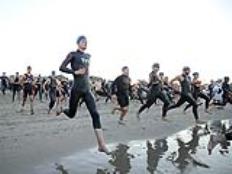"Athletes need more protein."
"Protein is crucial for muscle repair and recovery."
"Eat plenty of lean protein."
While you certainly need amino acids from protein for muscle repair and recovery, neurotransmitter formation and to avoid muscle wasting, the importance of protein is often blown way out of proportion.
How Much Protein Do You Actually Require?
1 of 6
To determine how much protein you should consume, you need to be familiar with an important term: nitrogen balance.
Nitrogen enters your body when you consume protein or amino acids, and nitrogen exits your body in your urine as ammonia, urea and uric acid—all breakdown products of protein. When the amount of protein you eat matches the amount of protein you use, you're in nitrogen balance.
If you don't eat enough protein, you'll be in negative nitrogen balance and your body won't be able to repair muscle after a workout (a "catabolic" state). If you consume too much protein, you'll be in positive nitrogen balance (an "anabolic" state).
While you'll have what you need for muscle repair, there can be some health issues that arise when you achieve too positive a state of nitrogen balance. Your body gets overfilled with ammonia, urea and uric acid, which, aside from the impact on your aging and longevity, can also have some nasty side effects.
Find:
Your Next TriathlonThe Science
2 of 6
The National Institute of Health's current Recommended Dietary Allowance is 0.36 grams of protein per pound of body weight per day (0.8g/kg), and this amount is necessary for the average person to be in nitrogen balance without protein deficits or protein excess. While athletes and frequently exercising individuals need more protein than this, you'll frequently see bodybuilders, football players, weightlifters and other big strength and power athletes consuming much more than what the RDA recommends. Unfortunately, this high amount of protein seems to be catching on in endurance sports, too.
Studies suggest that there isn't much additional benefit of exceeding 0.55 grams of protein per pound (1.2g/kg) of body weight if you want to maintain nitrogen balance. If you're trying to exceed nitrogen balance to gain muscle or recover from more extreme exercise sessions, studies also indicate that you don't need to eat more 0.7 g/lb.
Find:
Your Next TriathlonIn Context
3 of 6
So let's put those numbers into context. If you weigh 175 pounds and you want to make sure you're getting enough protein for muscle recovery and body repair, you should eat a minimum of 96 grams of protein.
Rounded up to an easy number of 100 grams, that means you could have a couple scoops of protein powder with your morning breakfast, a can of sardines over your salad at lunch, and four to six ounces of grass-fed beef with dinner. That's easily 100 grams and doesn't even count the other protein you may get from seeds, nuts, grains, legumes, etc. If you're eating about 3,200 calories a day, that puts your protein intake at about 13 percent.
If you want to gain muscle or you do a large amount of muscle damaging exercise such as a long, hard run, you would eat about 125 grams of protein. So you could add in a couple handfuls of raw almonds and a dollop of full fat yogurt, or a couple extra scoops of protein powder.
Find:
Your Next TriathlonWhat Happens If You Eat Too Much Protein?
4 of 6
First, consider that ammonia is a toxic compound to the body. Once you get close to about 250 grams a day of protein, you can no longer convert ammonia to urea and it begins to build up in your body. This is extremely stressful on your internal organs, especially your kidneys.
Next, excess protein can cause dehydration if you do not drink enough water. This is because your kidneys need more water to convert ammonia into urea.
Finally, mammalian target of rapamycin is a gene in your body that is directly correlated to accelerated aging. Decreased activity in this gene can be caused by moderate caloric restrictions and slightly lower amino acid intake. In other words, excessive protein intake and a constant positive nitrogen balance could actually shorten your life.
Find:
Your Next TriathlonThe Take-Away
5 of 6
Eat as much protein as your body needs for repair and recovery (about 0.55g/lb) and eat a little more if you want to put on muscle (up to 0.7g/lb). For fueling more intense bouts of physical activity, the rest of your calories should come from healthy fats and vegetables with limited amounts of fruits and natural starches such as sweet potatoes, yams and white rice.







Discuss This Article